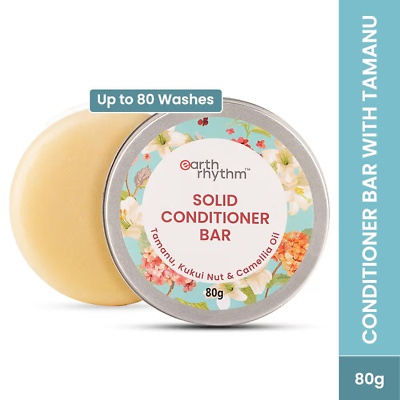
Tamanu Oil, Kukui Oil, Camellia Seed Oil Conditioner Bar
Ingredients overview
Highlights
Key Ingredients
Skim through
| Ingredient name | what-it-does | irr., com. | ID-Rating |
|---|---|---|---|
| Organic Butyrospermum Parkii (Shea) Butter | emollient | goodie | |
| Calophyllum Inophyllum (Tamanu) Oil | soothing, emollient | goodie | |
| Aleurites Moluccana (Kukui Nut) Oil | soothing, emollient | goodie | |
| Camellia Oleifera (Camellia) Seed Oil | emollient | goodie | |
| Guar Hydroxypropyltrimonium Chloride | viscosity controlling | ||
| Quaternium-91 | |||
| Cetrimonium Methosulfate | antimicrobial/antibacterial, emulsifying, surfactant/cleansing | ||
| Cetearyl Alcohol | emollient, viscosity controlling, emulsifying, surfactant/cleansing | 1, 2 | |
| Dipalmitoylethyl Dimonium Chloride | |||
| Tocopherol | antioxidant | 0-3, 0-3 | goodie |
Earth Rhythm Tamanu Oil, Kukui Oil, Camellia Seed Oil Conditioner BarIngredients explained
Unless you live under a rock you must have heard about shea butter. It's probably the most hyped up natural butter in skincare today. It comes from the seeds of African Shea or Karite Trees and used as a magic moisturizer and emollient.
But it's not only a simple emollient, it regenerates and soothes the skin, protects it from external factors (such as UV rays or wind) and is also rich in antioxidants (among others vitamin A, E, F, quercetin and epigallocatechin gallate). If you are looking for rich emollient benefits + more, shea is hard to beat.
An oil coming from cool places like Tahiti, Bora Bora, and the island of Polynesia. Similar to other more common plant oils, it's loaded with nourishing and moisturizing fatty acids (oleic acid: 40%, linoleic acid: 35%, palmitic acid: 15% and stearic acid: 11%).
Its unique thing is that it contains calophyllic acid that gives the oil extra healing and regenerating effects. A manufacturer even claims that tamanu oil can protect small capillary vessel and is recommended for redness and rosacea-prone skin.
Having such a cool name and coming from Hawaii how could this oil be not good? Well, it is good. It's absorbed excellently by the skin and is used traditionally by the Hawaiians to soothe sunburn and other inflammations.
Research confirms this: it's shown to have anti-inflammatory, pain reducing, and wound healing properties. It's also a particularly rich source of moisturizing essential fatty acids linoleic and linolenic (about 42 and 32%) and it's not so rich in oleic acid - around 15% - that can be good even for acne prone skin.
A beautiful golden-yellow oil coming from the Camellia tree. It's a 5 -10 meters high tree with spectacular white flowers native to Asia. It's pretty common there and also used as cooking oil or salad dressing. Sometimes Camellia oil is referred to as "the olive oil of Asia".
So what can it do for the skin? Similar to many other great non-fragrant plant oils, it's a great emollient and moisturising oil for dry skin. It's light in texture, absorbs fast into the skin and leaves it soft and supple.
It contains a bunch of good-for-the-skin stuff: it's very rich (70-85%) in nourishing and moisturising fatty acid, oleic acid (though if you are acne-prone be careful with oleic acid), contains significant amount of antioxidant vitamin E (0.15%) as well as great emollient and antioxidant squalene (2-3%).
All in all, a skin goodie especially for dry skin.



An extremely common multitasker ingredient that gives your skin a nice soft feel (emollient) and gives body to creams and lotions. It also helps to stabilize oil-water mixes (emulsions), though it does not function as an emulsifier in itself. Its typical use level in most cream type formulas is 2-3%.
It’s a so-called fatty alcohol, a mix of cetyl and stearyl alcohol, other two emollient fatty alcohols. Though chemically speaking, it is alcohol (as in, it has an -OH group in its molecule), its properties are totally different from the properties of low molecular weight or drying alcohols such as denat. alcohol. Fatty alcohols have a long oil-soluble (and thus emollient) tail part that makes them absolutely non-drying and non-irritating and are totally ok for the skin.

- Primary fat-soluble antioxidant in our skin
- Significant photoprotection against UVB rays
- Vit C + Vit E work in synergy and provide great photoprotection
- Has emollient properties
- Easy to formulate, stable and relatively inexpensive
You may also want to take a look at...
| what‑it‑does | emollient |
| what‑it‑does | soothing | emollient |
| what‑it‑does | soothing | emollient |
| what‑it‑does | emollient |
| what‑it‑does | viscosity controlling |
| what‑it‑does | antimicrobial/antibacterial | emulsifying | surfactant/cleansing |
| what‑it‑does | emollient | viscosity controlling | emulsifying | surfactant/cleansing |
| irritancy, com. | 1, 2 |
| what‑it‑does | antioxidant |
| irritancy, com. | 0-3, 0-3 |





